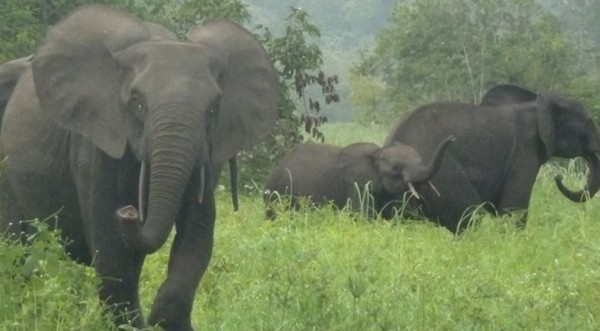By Ana Verayo, | February 21, 2017

Forest elephants in Gabon’s Minkébé National Park.
Researchers reveal how forest elephants living in Africa's largest reserve are apparently being hunted down by poachers. More specifically, about 78 to 80 percent of these majestic creatures have been killed for illegal trade in just 10 years.
In a new study by researchers from Duke University, they revealed how 25,000 elephants inside the Minkebe National Park in Gabon were slaughtered for ivory, between 2004 and 2014.
Like Us on Facebook
According to John Poulsen who is a Duke professor of tropical ecology, nearly half of Central Africa's 100,000 elephants have made Gabon their natural habitat. However, the loss of 25,000 elephants in a key sanctuary can push the species to the brink of extinction due to this lack of law and preservation.
Based on data taken from two surveys conducted during 2004 to 2014, researchers were able to track them using the dung left behind by these massive mammals in order to estimate the population decline inside the park's boundaries. New findings now suggest that a significant number of poaching is traced back to Cameroon, in Gabon's northern border.
Poulsen explains that based on the significant changes in the abundance and geographic distribution of the dung of these creatures, the team identified the two fronts where poaching has been persistent. Due to the lack of easily accessible roads in the southern region of the park, poaching acitivty has been lesser in this area.
However, the central and northern parts of the park area is apparently only a few miles from a major road that ends in Cameroon borders. This road is also connected to the biggest city in Cameroon, Douala which is a regional hotspot for illegal ivory trade.
Despite this, Gabon's local government has already implemented harsher and stricter rules against poaching in recent years. All forest elephants in the country are under full protection of law and the anti poaching law enforcement immediately confiscates illegal ivory and burns them. Gabon is also the first country in Africa to carry out these laws.
However, researchers suggest in this new study that even if Gabon is steadfast in protecting their animals, they also need help from neighboring nations.
Poulsen explains, in order to save Central Africa's forest elephants, there should be a need to implement multinational protected areas and coordinate this with international law enforcement. By doing so, this would ensure the prosecution of foreigners who commit wildlife crimes in other countries.
Researchers also say that their new findings show a 78 to 80 percent loss in a single decade, in one of the supposedly most remote and protected areas in Central Africa. Poulsen adds, there is simply no safe place from poaching.
To date, the team has been collaring these animals since 2015, to monitor the elephants and their behavior in the wild, including migrational patterns across Central Africa's nations. This new study is published in the journal Current Biology.
-
Use of Coronavirus Pandemic Drones Raises Privacy Concerns: Drones Spread Fear, Local Officials Say

-
Coronavirus Hampers The Delivery Of Lockheed Martin F-35 Stealth Fighters For 2020

-
Instagram Speeds Up Plans to Add Account Memorialization Feature Due to COVID-19 Deaths

-
NASA: Perseverance Plans to Bring 'Mars Rock' to Earth in 2031

-
600 Dead And 3,000 In The Hospital as Iranians Believed Drinking High-Concentrations of Alcohol Can Cure The Coronavirus

-
600 Dead And 3,000 In The Hospital as Iranians Believed Drinking High-Concentrations of Alcohol Can Cure The Coronavirus

-
COVID-19: Doctors, Nurses Use Virtual Reality to Learn New Skills in Treating Coronavirus Patients







